Steam now fighting review bombs with diagrams
Data will save us all, I'm told
All social problems can be solved by data, any naive tech company can tell you, which is why Valve are attempting to solve Steam 'review bombing' by adding graphs to its player reviews. Review bombing is the practice of players organising to leave negative reviews that drive down a game's rating in an attempt to punish or manipulate developers by damaging their future sales prospects. Games bombed over the past month range from Firewatch to Grand Theft Auto V. This is a known and old problem with Steam's reviews, and one Valve aren't happy with. So, to counterattack disproportionate bursts of negative reviews, Valve have added unusual activity warnings to Steam store pages with histograms tracking reviews over time.
If Steam detects a review bomb has potentially been dropped during the past month with an uncharacteristic spike of negative reviews, it pops up a warning above the review section of a game's store page. This lets players see a histogram showing positive and negative reviews over time, making it clear when a spike happened, and giving the option to show only reviews from the spike period. That's way down the page, mind, and the initial rating gives no indication that something unusual may be going on. It's also a system which really only makes sense to people who follow Steam goings-on and are aware of review bombs.
To people not in the know, the notice "High Volume of Negative Reviews Detected" could easily seem a warning that a game sucks.
The latest big review bomb was dropped on Firewatch earlier this month. Developers Campo Santo controversially filed a DMCA takedown against a video of their game made by Felix 'PewDiePie' Kjellberg after the mega-popular wavy 'Tube man casually said a racial epithet as an insult during a livestream of another game. In response, sympathising Steamers posted hundreds of negative Firewatch reviews, at a frequency far higher than the game has received since the initial launch burst. A second wave of positive reviews followed as others tried to counteract the bomb. Either way, the 'Mixed' recent review rating displayed at the top of Firewatch's Steam page is now mostly based on that tussle.
This might be helpful for people who want to dig into reviews but the impression of a game is still damaged and it still sucks that this is part of the reality developers face today. And bombs disproportionately affect games which sell fewer copies.
I've seen review bombs dropped over everything from wanting more frequent updates (which certainly can be a fair criticism, to be clear) to disliking a developer personally. They're protests, not reviews, channeled through a system protestors know can cause harm.
"In short, review bombs make it harder for the Review Score to achieve its goal of accurately representing the likelihood that you'd be happy with your purchase if you bought a game," Valve said in last night's announcement. "We thought it would be good to fix that, if we could do it in a way that didn't stop players from being able to voice their opinions."
Many other games have been bombed in the past month. Fallout 4 was hit after Bethesda added the Creation Club microtransaction DLC store.
Playerunknown's Battlegrounds has received several clusters of bombs. The biggest came as the developers added microtransactions for (ugly) cosmetic items, despite previously saying they wouldn't during early access. Steam's warning system also flags a potential bomb in late August, which seems to be cluster of overlapping complaints about issues including patches becoming less frequent and the developers banning suspected 'stream snipers' (a term for players who watch popular livestreamers playing and try to join their games and use knowledge of their location to kill or harass them).
Review bombers hit Dota 2 after Valve announced a spin-off card game, Artifact.
Grand Theft Auto V was bombed in June after 2K's lawyers foolishly shut down modding tool OpenIV (a decision later reversed). Another bomb hit in August after Rockstar's attempts to remove cheated cash from GTA Online hit some players who swore blind they had never touched funny money.
Valve observe:
"On the one hand, the players doing the bombing are fulfilling the goal of User Reviews - they're voicing their opinion as to why other people shouldn't buy the game. But one thing we've noticed is that the issue players are concerned about can often be outside the game itself. It might be that they're unhappy with something the developer has said online, or about choices the developer has made in the Steam version of their game relative to other platforms, or simply that they don't like the developer's political convictions. Many of these out-of-game issues aren't very relevant when it comes to the value of the game itself, but some of them are real reasons why a player may be unhappy with their purchase."
Valve observe that the long-term effects of review bombs are limited, with game ratings usually returning to close to their previous state over a long enough timescale. It still sucks in the short term.
The Steamlords say they had considered fighting bombs by removing review scores from store pages, so people would need to read actually reviews. "Unfortunately, we're pretty certain that this isn't really an option," they say, as review scores were added by popular demand.
They had also thought about review locks. "Based on the theory that review bombs are temporary distortions, we could prevent reviews for short periods of time whenever we detect massive distortions in submissions." But they didn't like that either. "We don't want to stop the community having a discussion about the issue they're unhappy about," they say, "even though there are probably better places to have that conversation than in Steam User Reviews."
For now, the solution we get is more data. Data will save us all, I'm told.
Looking ahead, Valve say they plan to shift using "personalized review scores, where our prediction of your happiness with a purchase is based upon the games you've enjoyed in the past." Given that Steam's use of similar data for recommendations is still pretty wonky, I'm slightly wary of this. As volatile and vulnerable as Steam reviews are, at least they don't carry the weird assumptions of big data.
Disclosure: I'm pals with some of the Campo Santo lot. I visited a redwood forest with one. Everything is simpler in the trees.
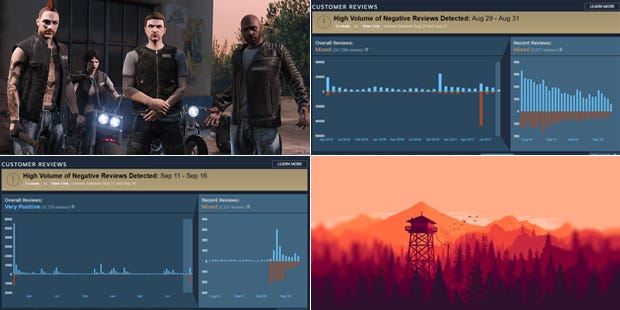


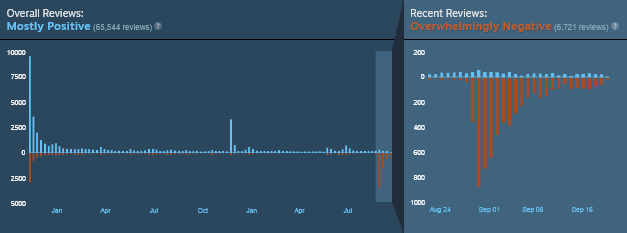
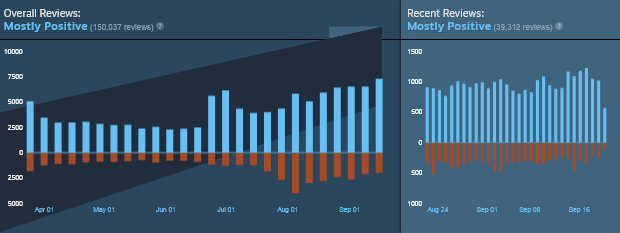

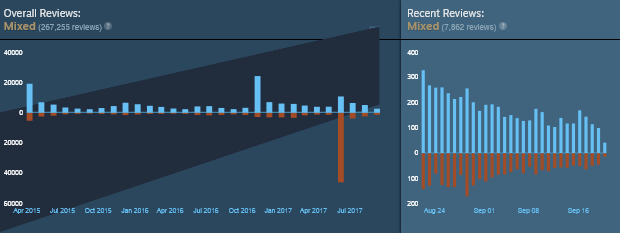
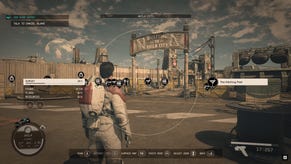



.jpg?width=291&height=164&fit=crop&quality=80&format=jpg&auto=webp)


